Legal Age To Serve Alcohol: Key Findings
- The minimum legal age to serve alcohol in the U.S. varies by state, typically ranging from 18 to 21.
- Serving alcohol may require certifications or training, and the legal age to serve alcohol can vary by establishment and beverage type.
- Job seekers for roles like Barback or Bartender must follow state laws and employer policies to avoid legal issues.
While the federal minimum drinking age is 21, the legal age to serve alcohol in restaurants and bars varies by state, with some allowing individuals as young as 18 (or even younger in certain cases).
This guide provides a comprehensive overview of state-specific legal age to serve alcohol requirements across all 50 states plus Washington, D.C.
Legal Age To Serve Alcohol
As mentioned, the minimum legal age to serve alcoholic beverages varies widely across the country. For clarity, we’ve organized this information into a table summarizing the minimum age requirements by state.
Can you serve alcohol if you are 18?
You can legally serve alcohol at 18 in 26 states. However, you should always check local laws and regulations, as there may be exceptions.
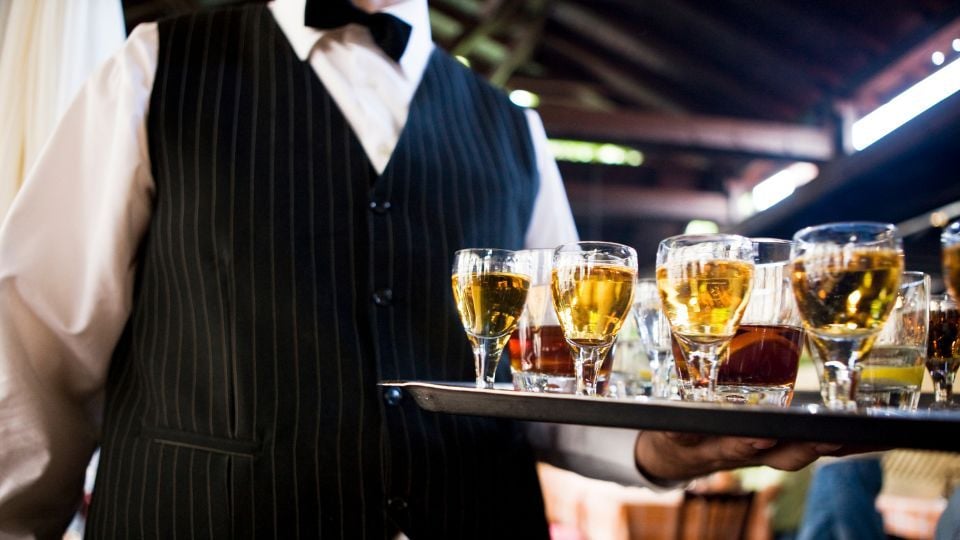
For instance, while Illinois permits alcohol service at 18, Chicago requires servers to be at least 21. Checking city-specific regulations can help ensure compliance.
Five states, including Alabama, Arkansas, Idaho, New Hampshire and West Virginia, follow federal law without exceptions.
Minimum age to serve alcohol
To serve alcohol on-premises, you generally need to be at least 18 years old, with a few exceptions like Maine and Michigan, where the age limit is 17 under supervision.
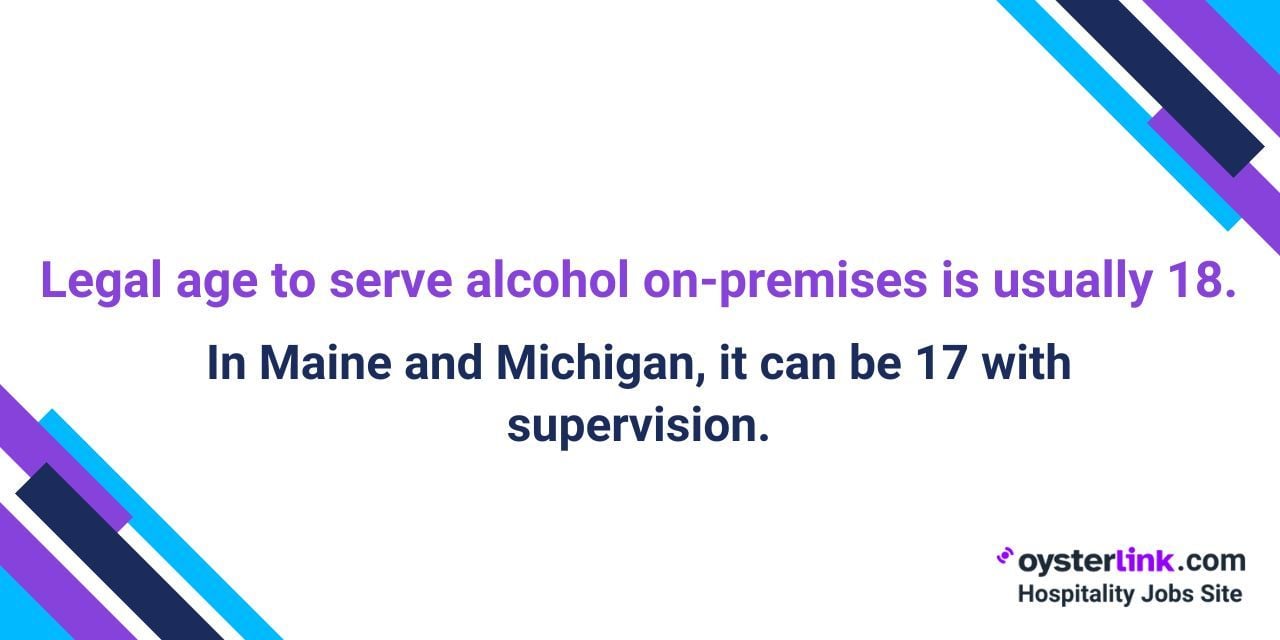
Detailed regulations on alcohol service are provided by the Alcohol Policy Information System (APIS), covering both federal and state guidelines.
Is 21 the required age to be a Bartender?
In 17 states, you must be 21 to work as a Bartender. Moreover, some municipalities within those states have different rules. In some cases, you'll also need to have a bartending license or an alcohol server certification.
Can you work as a Bartender at 18?
You can legally bartend and serve liquor at 18 in 26 states. However, each state and even individual municipalities may have additional restrictions or requirements.
Furthermore, establishments can set their own hiring qualifications and require Bartenders to be of legal drinking age. This is to mitigate the risk of alcohol abuse and having their liquor license revoked.
Are minors allowed to sell alcohol?
In some states, such as Arizona, minors are allowed to sell alcohol in off-site stores. They need to be of legal working age (16) and they'll need to be supervised by someone at least 19 years old.
These minors must work in establishments where the primary product isn’t alcohol.
State-Specific Variations in the Legal Age to Serve Alcohol
While the legal age to serve alcohol typically ranges from 18 to 21 across various states, certain states have unique regulations and exceptions. For instance, in West Virginia, individuals as young as 16 are permitted to serve alcohol, whereas in Michigan and Maine, 17-year-olds may serve alcohol under the supervision of a manager or supervisor who is at least 21 years old.
Legal Age to Serve Alcohol in Different Venues
The legal age to serve alcohol can vary not only by state or region but also by the type of venue. Understanding these differences is important for business owners and staff to ensure they comply with the law while operating effectively.
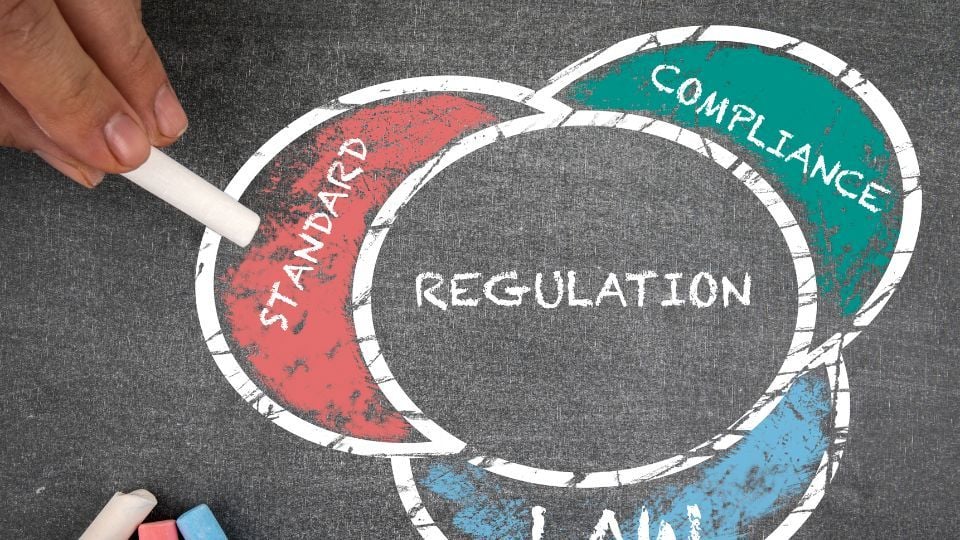
- Restaurants vs. nightclubs: Age requirements can differ based on the establishment type. Restaurants may allow staff under 21 to serve beer and wine, while nightclubs and bars often require all servers to be 21 due to stricter alcohol laws and monitoring responsibilities.
- Specialized venues: Stadiums, concerts, and event venues may have unique rules depending on permits and staffing arrangements. For example, in some arenas, in-house employees and outside vendors may follow different age guidelines.
- On-Premise vs. off-premise: The legal age to serve alcohol often depends on where it will be consumed. On-premise service (like in bars and restaurants) may have stricter requirements than off-premise sales (like grocery or liquor stores).
By including these details, you can better guide employers in understanding the complexities of alcohol service laws in different venues and help them manage staffing requirements and compliance in various settings.
How the Legal Age to Serve Alcohol Affects Staffing and Operations
The legal age to serve alcohol significantly influences employment opportunities within the hospitality industry. In states where the minimum age is 18, a broader pool of candidates is available for roles involving alcohol service.
Conversely, in states with a minimum age of 21, employers face a more limited selection of eligible applicants, potentially leading to staffing challenges. Understanding these dynamics is crucial for both job seekers and employers in the hospitality sector.
- Hiring challenges: In states where the legal age to serve alcohol is 18, employers have a larger candidate pool. Where the minimum is 21, hiring is harder and may increase recruitment costs.
- Scheduling considerations: Employers must align staff schedules with local alcohol laws. This often means ensuring legal-age employees cover peak service hours.
- Training Requirements: Stricter alcohol laws may require more intensive training. Staff need to understand both legal rules and practical skills like spotting intoxication.
Legal Age to Serve Alcohol On-Premise vs Off-Premise
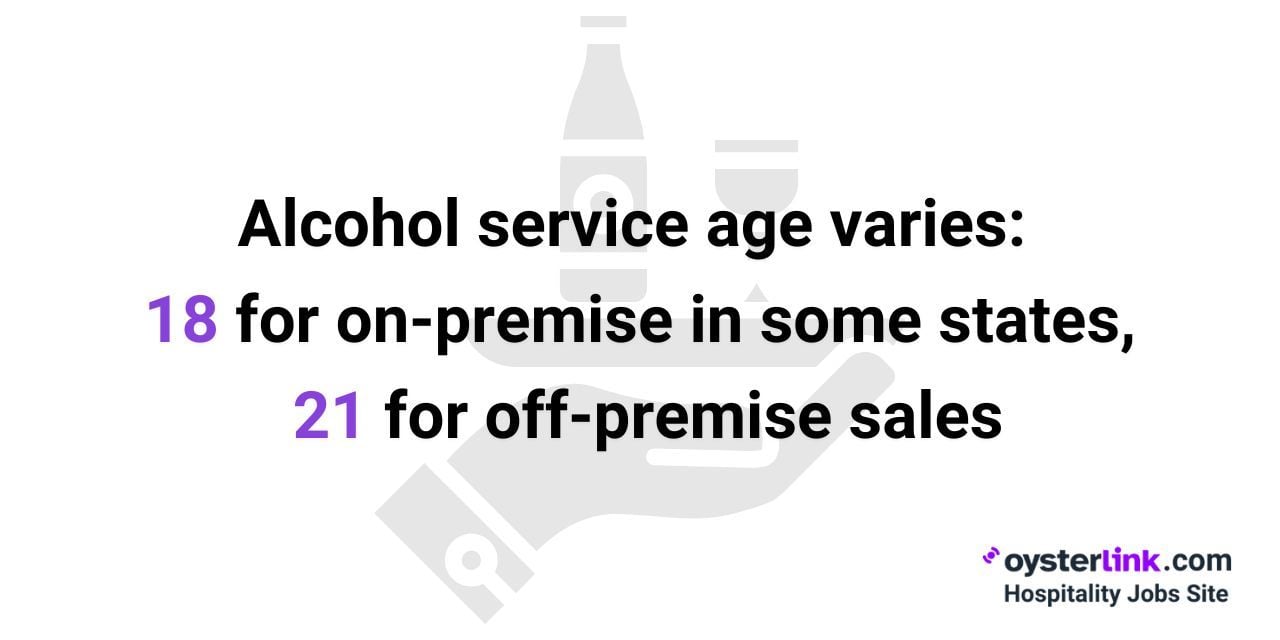
It's important to note that age requirements can differ not only between states but also based on the type of establishment.
For example, some states may allow individuals aged 18 to serve alcohol in restaurants (on-premise consumption) but require employees to be 21 to sell alcohol in liquor stores (off-premise consumption).
These distinctions are vital for employers to consider when hiring staff for different roles within their establishments.
How the Legal Age to Serve Alcohol Applies to Special Events and Temporary Licenses
Special events and temporary alcohol licenses introduce additional complexities into alcohol-serving regulations. These situations often involve unique circumstances where different laws and exceptions come into play.
- Temporary event licenses: Many cities and states allow bars, restaurants or even non-profit organizations to serve alcohol at special events under temporary licenses. These events might include outdoor festivals, charity fundraisers or food and wine tastings. While the legal age to serve alcohol may remain the same, the application process for temporary licenses often includes additional oversight, such as a designated Event Manager or Server training specific to the event.
- Different rules for events: In some jurisdictions, the legal drinking and serving age may be adjusted for specific events. For example, a festival may have a separate legal framework, allowing younger staff members to serve alcohol in certain conditions or allowing attendees under 21 to drink with a guardian or adult. However, it’s crucial to check with local authorities for specifics since each location may have its own regulations regarding special permits and events.
- Alcohol service restrictions: For events where temporary alcohol service is permitted, there may be additional rules governing the types of alcohol that can be served (e.g., beer and wine vs. hard liquor), how the alcohol is distributed (e.g., tickets or wristbands) and how much alcohol can be served to a single individual. Event organizers need to adhere strictly to these regulations to avoid fines or other penalties.
Responsible Service and Bartending Licenses
Many states require Servers and Bartenders to have a license, often as a condition of employment. Federal, state and local agencies regulate alcohol service laws, with the Alcohol and Tobacco Tax and Trade Bureau (TTB) enforcing federal regulations. State and local agencies handle laws within their jurisdictions.
In 18 states, a bartending license is mandatory: Alaska, California, Delaware, Illinois, Indiana, Louisiana, Montana, Nevada, New Mexico, Oklahoma, Oregon, Pennsylvania, Rhode Island, Tennessee, Utah, Vermont, Washington and Wisconsin.
In seven states, requirements vary by county, with local authorities setting the rules: Hawaii, Idaho, Kentucky, Nebraska, New Jersey, North Dakota and Wyoming.
In Alabama, South Carolina and South Dakota, licensing depends on age and role. License costs typically range from $10 to $50, with renewal terms differing by state.
Penalties for Noncompliance: What Employers Need To Know
Failure to comply with alcohol-serving laws can result in severe penalties for both employers and employees. These penalties can range from monetary fines to the revocation of liquor licenses, which can significantly disrupt an establishment's business operations.
- Fines and citations: Violating age restrictions when serving alcohol often results in financial penalties and formal citations from local or state authorities. The amount can vary widely, and in some cases, fines may significantly affect an establishment’s financial stability.
- Liquor license revocation: Repeated or serious violations of alcohol service laws can lead to suspension or permanent loss of a liquor license. Since alcohol is a primary revenue stream, losing this license can be devastating for many businesses.
- Criminal charges: Employees or employers who knowingly serve alcohol to underage individuals may face misdemeanor or felony charges. In some states, personal liability laws also hold the individual server accountable, even if management was unaware.
- Impact on reputation: Beyond legal consequences, violations can damage an establishment’s public image. Negative publicity may deter customers, lower staff morale and make hiring more difficult.
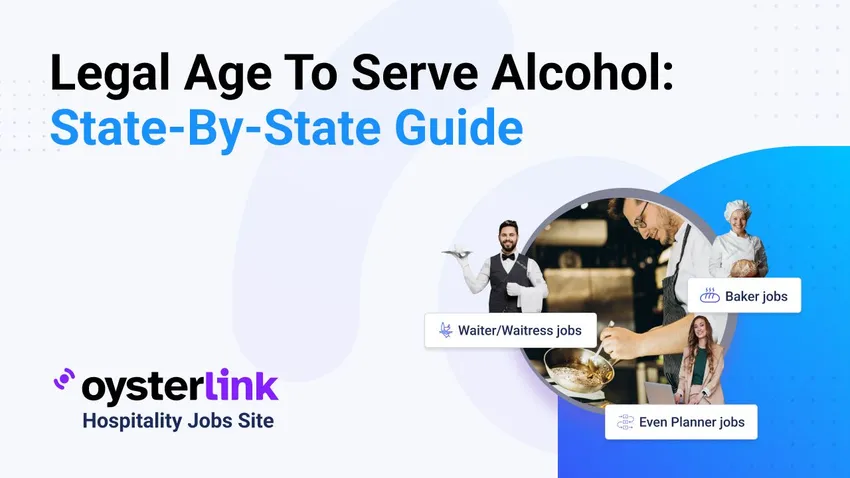










Loading comments...